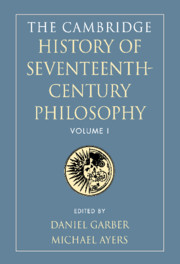Book contents
- Frontmatter
- Introduction
- I The context of seventeenth-century philosophy
- II Logic, language, and abstract objects
- III God
- 10 The idea of God
- 11 Proofs of the existence of God
- 12 The Cartesian dialectic of creation
- 13 The relation between theology and philosophy
- 14 The religious background of seventeenth-century philosophy
- IV Body and the physical world
- V Spirit
- Bibliographical appendix
- Bibliography
- References
12 - The Cartesian dialectic of creation
from III - God
Published online by Cambridge University Press: 28 March 2008
- Frontmatter
- Introduction
- I The context of seventeenth-century philosophy
- II Logic, language, and abstract objects
- III God
- 10 The idea of God
- 11 Proofs of the existence of God
- 12 The Cartesian dialectic of creation
- 13 The relation between theology and philosophy
- 14 The religious background of seventeenth-century philosophy
- IV Body and the physical world
- V Spirit
- Bibliographical appendix
- Bibliography
- References
Summary
TWO COMPETING TENDENCIESo
By the seventeenth century, theology had established constraints on the development of metaphysics not unlike those it had imposed nearly a millennium earlier on church music. Like the cantus firmus, to which counterpoint and polyphony are conjectured to owe their existence, these constraints were both a source of problems and a standard for success. In the seventeenth century, a main cantus firmus was the notion of God as creator ex nihilo. Although the dogma was not without ambiguity as late as the Council of Nicea (a.d. 325), creation of the world ex nihilo had been defined against the dualism of the Albigensians and Cathars by the Fourth Lateran Council (1215): ‘We firmly believe in God … the creator [creator] of all things visible and invisible, spiritual and corporeal, who by His almighty power established, from nothing, at the same time from the beginning of time, both spiritual and corporeal creatures [simul ab initio temporis utramque de nihilo condidit creaturam spiritualem et corporalem].’ In addition, and against the same opponents, the church insisted upon the providence of God that allowed evil in creation. Thus, although omnipotent, God nonetheless was believed to create with wisdom. God's wisdom was a divine attribute that in the seventeenth century gained metaphysical prominence even as final causes were being expunged from physical explanations.
The seventeenth century was not notably more successful than any previous period in making sense of the notion of creation ex nihilo. Greek antiquity found the notion unintelligible and rejected it. But constrained by their theology, the mediaevals were obligated to embrace the notion, not without philosophical difficulty. Aquinas, for example, adopted a position found at least as early as the fourth century in Gregory of Nyssa according to which God's creation is absolutely free, yet necessarily motivated solely by the communication of His goodness
- Type
- Chapter
- Information
- The Cambridge History of Seventeenth-Century Philosophy , pp. 331 - 362Publisher: Cambridge University PressPrint publication year: 2000
References
- 5
- Cited by



